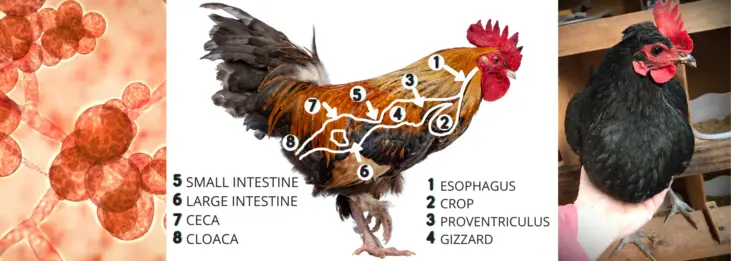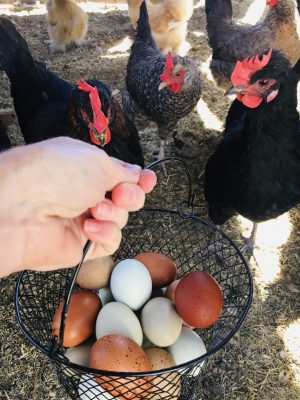
Chickens can develop sour crop when a fungus called candida albicans gets out of hand. The key to successful chicken sour crop treatment is catching it early. The sooner you are able to identify it and begin treatment for it, the more likely you are to cure it.
While it is normal for candida to be present in a chickens’ crop, there are certain things that can make it get out of control.
| CAUSES OF SOUR CROP |
|---|
| CROP IMPACTION |
| FUNGAL INFECTION |
| ANTIBIOTIC USE |
| WORMS |
| SLOW EMPTYING OF CROP |
What is a Chicken Crop?

A chicken crop is a temporary storage pouch for its food. Because chickens are prey animals and are at risk of becoming attacked by predators, they swallow their food whole. This shortens the amount of time out in the field foraging for food. Instead, it is stored in the crop until the chicken can safely break it down as it is pushed along through its digestive system.
How Long Does It Take For a Crop to Empty?

A normally functioning chicken crop is emptied once a day, every 24 hours. It is swollen and slightly firm after a meal. First thing in the morning, before a chicken consumes any food for the day, it should be completely empty and difficult to palpate.
What is Sour Crop?
Sour crop is a growth of a fungus, candida albicans, or yeast infection in the chicken crop. It can develop because it is emptying too slowly, impacted, worms, yeast infection or previous antibiotic use. A sour crop will look like a large lump at the base of the neck, feel soft and squishy, smell sour and if you listen carefully you can hear a gurgling sound.
Signs of a Sour Crop
| SIGNS OF A SOUR CROP | |
|---|---|
| LOOK | LARGE LUMP AT BASE OF NECK, RIGHT OF BREASTBONE SOMETIMES WHITE PATCHES IN MOUTH |
| FEEL | SOFT AND SQUISHY LIKE A WATER BALLOON |
| SMELL | CHICKENS BREATH MAY BE SOUR OR “YEASTY” |
| LISTEN | GURGLING NOISE |
Identifying chicken illness can be difficult, but chicken sour crop does have some classic signs to look for.
During the day it is normal for your chickens crop to be full, but it should feel slightly firm and not squishy.
If you smell your chickens’ beak, you will notice a sour smell. This smell is the fermenting yeast in the crop.
If you listen to your chickens’ stomach you may notice a gurgling sound. This gurgling is the gases of the yeast in the crop.
It is important to catch it in the beginning in order to have a positive outcome. Sour crop that gets really bad can spread into a chickens esophagus and stomach.
How Do You Treat Sour Crop?

I am not a veterinarian or a medical professional. It is always best to contact your veterinarian for any medical issues. There are so many different “cures” for sour crop. This is what works for me and for many other chicken keepers.
If you find yourself saying, “I think my chicken is sick.” Listen to your intuition, because you know how your chicken usually acts and something must be off.
The best thing to do is to catch sour crop in the very early stages. You have a better chance of being able to conquer this yeast, if you catch it early. This can be done by doing a daily scan (with your eyes) of your flock, looking for any crop bulging. It doesn’t take long to do and you can be checking for any injuries at the same time.
It is important to start sick chicken treatment for sour crop right away if you suspect it has it. Start your 7 Day Sour Crop Treatment right away.
DAY 1: QUARANTINE
If you notice one of your flock has sour crop, it’s best to quarantine them in an area you can observe them and stop them from continuing to eat regular feed. During the days of quarantine you will provide bedding, perch and water with ACV. Withhold food the first 24 hours. Add 1 TBS of Apple Cider Vinegar per 1 gallon of water.

The reason that you want to withhold food the first 24 hours is to be able to check their crop in the morning to see if it is emptying at all and also to starve the yeast.
ACV, Apple Cider Vinegar is an anti-fungal. So it will help to kill the yeast.
DAY 2: MASSAGE CROP
This should be done several times a day or every couple hours. There are two different common massage methods for sour crop. One is getting your chicken to regurgitate the contents in the crop with massaging and the other gets it to pass into the stomach.
A lot of people don’t like the method that causes the chicken to regurgitate. The liquid that your chicken expels will be a brownish color and smell very foul or sour. You have to be really careful that your chicken does not aspirate any material that it brings up.
Hold your chicken, tilted forward, as you massage the crop. Most chickens with a full, sour crop will regurgitate when you do this. Make sure that you keep your chicken tilted forward. THERE IS A RISK OF ASPIRATION. If you do not feel comfortable doing this, choose the next method.
The other method is to help get the contents of your chickens crop to pass into its stomach. Hold your chicken on your lap and gently massage your chickens crop in a downward motion. You are trying to work what is in the crop down into the stomach.
If you notice improvement, move on to adding yogurt for day 3. If you do not see any improvement or symptoms begin to worsen, contact your veterinarian for advice. If home treatment for sour crop is not started right away it may be necessary for a vet to prescribe a round of anti fungal medication such as nystatin.

DAY 3: ADD YOGURT
Add plain yogurt to your chickens diet on day 3. It is important that you choose a PLAIN yogurt, not one with added sweeteners. It is also important to choose a yogurt that has LIVE ACTIVE CULTURES in it. Most yogurts on the market today do have live cultures in them, but just make sure.
For a recipe for lactose free yogurt for chickens, read my article How to Make Homemade Instant Pot Yogurt for Chickens
Plain yogurt with live active cultures will starve the yeast but feed the chicken. It will also replenish the beneficial bacteria that the yeast has been eating up.
Continue with the daily crop massages and ACV in the water.
If you notice improvement, move on to adding scrambled eggs in day 4.

DAY 4: ADD SCRAMBLED EGGS
Yeast feeds on carbohydrates and scrambled eggs are very low in carbohydrates. Feed 3-4 small meals of scrambled eggs in addition to the plain yogurt.
Continue with the daily crop massages, yogurt and ACV in the water.
If you notice improvement, move on to reintroducing regular feed in Day 5.

DAY 5: ADD REGULAR FEED
Gradually reintroduce your chickens’ regular feed by adding it to the yogurt and scrambled eggs. Avoid any treats, seeds, grasses, fruits, sweets, etc.
Continue with the daily crop massages, yogurt, scrambled eggs and ACV in the water.
DAY 6: SAME AS DAY 5
Continue to give more of the regular feed and monitor the crop. If you notice continued improvement, you can reintroduce your chicken back to the flock on Day 7.
DAY 7: REINTRODUCE TO FLOCK
When your chickens’ crop is empty first thing in the morning, it is ready to be reintroduced back into the flock. Monitor your chicken more closely for the next several days to make sure it does not develop sour crop again.
Sour Crop Prevention in Chickens
| TIPS FOR SOUR CROP PREVENTION |
|---|
| FREQUENT CROP INSPECTIONS |
| OCCASIONALLY GIVE YOGURT AS A TREAT |
| KEEP GRASS CLIPPINGS TO LESS THAN 2″ |
| ACV TO WATER 1X/MONTH |
| KEEP YARD FREE OF DEBRIS (STRING, PLASTIC) |
| AVOID SWEETS |
| AVOID HIGH CARBOHYDRATES(BREADS) |
| PROVIDE GRIT |
| DON’T SERVE MOLDY FOOD |
The best thing that you can do is to take precautions and avoid sour crop from occurring in the first place. Sour crop will be less likely to occur if you offer occasional probiotics, such as yogurt to their diet and adding ACV (anti-fungal) to their water once a month.
Always have grit available for your chickens to consume. This will help to break down the food once it makes it to your chickens gizzard.

Keep your grass clippings to less than 2″ in order to avoid the grass from getting tangled up in the crop, causing an impaction. Make sure there isn’t any debris in your yard that the chickens might consume, such as string, plastic or other tiny objects a chicken might think is food.
Avoid moldy foods, foods high in carbohydrates and sweets. Too much of any of these can cause the growth of candida albicans to get out of hand and lead to a sour crop.
Conclusion: Chicken Sour Crop- How to Best Cure
The best thing is to prevent chicken sour crop from developing in the first place. If your chicken develops a sour crop and you catch it very early, it is possible to cure it with home treatment. If you find that your chicken has a severe sour crop and is not improving, it is best to contact your veterinarian for advice and treatment.




